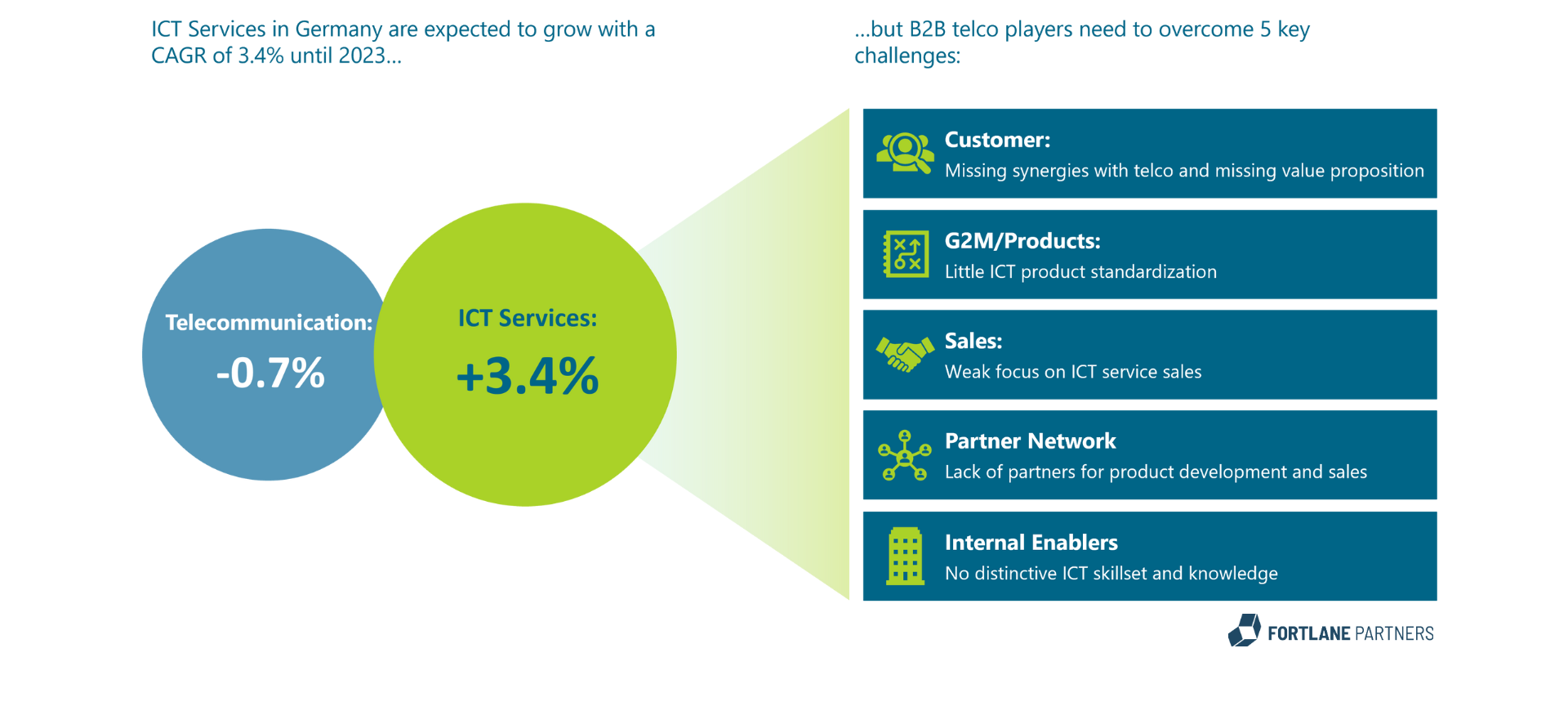Boost ICT services to win the B2B market
Telcos enjoy an advantageous position for pushing into the ICT market. However, most telcos have moved too slowly to offset the market share gains of mighty tech companies. Given the fast pace at which these companies spread throughout the ICT market and cut out telcos in the process, the time to gain a strong foothold in the ICT market is ticking away and the time for telcos to act is now.

Scroll down
Most global telecommunication companies have sought growth opportunities in the market for connectivity services over the past years. Especially in the B2B segment, telcos generate a majority of revenues from this source. However, telcos world wide as well as in the GSA region have come under significant pressure with revenues decreasing by -0.5% per year1 and average revenues per user (ARPU) plummeting by -3%2 per year over the years 2011-2019. With the commoditization of connectivity services, telcos urgently need to refocus their business models and seek new revenue streams within the B2B space.
ICT market: Challenging but promising
With an annual growth rate of +3.4% in Germany, the ICT market for small and medium enterprises (SMEs) represent a significant revenue source. Even though half of all German SMEs increased their ICT budget over the past two years3, only a few large telcos have managed to successfully monetize this potential so far. This is despite the many ICT challenges SMEs still encounter like migrating from classic telecommunication to VoIP, hosting and housing of servers to cloud-based XaaS solutions, as well as implementing security and remote workplace solutions for employees.
Large IT companies such as Microsoft or AWS have already addressed this potential and are gaining significant marketshare. Nevertheless, it is still a very fragmented market characterized by little product standardization.
Now is the opportunity for telcos to expand their traditional connectivity portfolio with ICT (e.g. managed services, IoT products, ICT security), to leverage their existing customer base and to position themselves as one-stop-shop for SMEs. Unfortunately, telcos still struggle to gain traction in the ICT market. Challenges are multifold and can be grouped into five key categories: customer segmentation, go-to-market & products, sales approach, partner network, and internal enablers.

Winning in ICT: Key success factors
Based on market insights and project experience in the aforementioned areas, Fortlane Partners has identified multiple success factors to overcome these challenges.
Market and product-oriented customer segmentation is key to enable efficient go-to-market and sales processes, as well as to improve customer satisfaction based on a tailored, segment-specific approach. Offering managed services across all segments strengthens customer relationships, builds loyalty and generates further insights to maximize customers' share of wallet. In addition, customer care can be provided according to the customer’s products and solutions.
In order to serve the different customer segments appropriately, go-to-market approach & product portfolio have to be adapted. Telcos need a clear product strategy in which they define their specific go-to-market approach, e.g. pure reselling, reselling white-label products, own branding and product enhancements, or proprietary solutions. Splitting product management into a technical and market-oriented part helps in two ways: Firstly, continuous market feedback strengthens the alignment of product features and customer needs. And secondly, the technical modular basis of products ensures scalability and avoids monolithic developments. As a result, product portfolios can be simplified and standardized to the maximum possible extent with additional customization according to customer needs. This reduces time to market and costs, enabling companies to offer more competitive prices.
To improve the sales approach for ICT products, sales resources need to be efficiently allocated from a stagnant connectivity business to the growing ICT segment. However, to successfully generate ICT revenues, a more in-depth ICT knowledge is required, which most sales personnel simply does not have. The sales force needs to understand customer requirements to be able to comprehensively consult them regarding their ICT needs, and to mitigate sentiments about the perceived product complexity. Dividing sales personnel into ‘hunters’, which aggressively acquire new ICT services business, and ‘farmers’, who focus on retaining as well as up-/cross-selling existing customers will enable revenue growth. While the hunter’s role is to win new business, the farmer’s job aims at increasing the customer’s share of wallet which creates further exit barriers. Furthermore, marketing resources need to be allocated to increase brand awareness and reputation of telcos as relevant providers of ICT services. Lastly, the online sales strategy must be improved as many B2B customers increasingly use online channels before contacting a sales representative.
Another success factor is to fundamentally rethink partner strategies. Telcos must evaluate their need for different partnership models and identify suitable partners accordingly. In sales, for example, partner selection is vital to successfully serve customers' needs. A smart partner selection can enable telcos to offset inherent disadvantages (e.g. size imbalance) of their business model, especially when focusing on ICT products. To facilitate forming these partnerships, telcos should increase their attractiveness for sales partners via commissions, product offering, and training. Once partnerships are established, the performance of partners must be continuously monitored to deploy retention measures and benefits for those performing well. Thereby, attractiveness measures increase efficiency and effectiveness, which decreases overall commission cost while retaining high-performing partners and weeding out low-performing ones. Beyond sales, telcos also require strategic partnerships with technology leaders, and other key players in the ICT market to strengthen the product portfolio.
Internal enablers lay the foundation for a successful ICT service offering in any telco. A clear roadmap about the necessary skills and capabilities required for the shift in business focus needs to be established. Telcos have to build up ICT capabilities by e.g. hiring experienced ICT services personnel and empower them to implement the required mindset change, away from connectivity towards ICT services – not only on an operational level but also on a management level. Top management buy-in, as well as training and enablement, will help telcos to ensure ICT readiness, to further drive the mindset change on all levels and to facilitate the building of a credible perception of expertise.
Key success factors to overcome challenges
- Segment customers
- Define clear product strategy
- Enable sales
- Rethink partner network
- Build up ICT capbilities
Summary
In conclusion, the presented success factors allow telcos to capitalize on the fast- growing SME ICT market. However, the corresponding measures need to be implemented quickly to cut a clear path into the fragmented but fast-growing market and claim a share besides the large tech companies and OTTs. Through leveraging their existing customer base and access, telcos can position themselves as a one-stop-shop and trusted partner for SMEs.
Ultimately, telcos enjoy an advantageous position for pushing into the ICT market. However, most telcos have moved too slowly to offset the market share gains of mighty tech companies. Given the fast pace at which these companies spread throughout the ICT market and cut out telcos in the process, the time to gain a strong foothold in the ICT market is ticking away and the time for telcos to act is now.
KontaktSprechen Sie uns an



